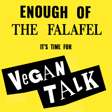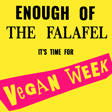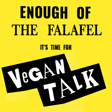
209- Walking dogs is OUT, but eating horses is IN: Mailbag Episode #8
The Iranian government may be cracking down on dog walking, but wild horses are on the menu in the USA and Danish Zoos are accepting elderly pets...as food for the carnivores. In other news, our 'Classic Episode' rerun of vegetarians being triggering for vegans...triggered a vegan!
Paul & Ant sift through the mailbag & discuss your correspondence. Thanks Shane for your prolific volume of messages towards this show!
To feature on our next mailbag episode, or to get in touch in general, send us a message via enoughofthefalafel@gmail.com
*************
Enough of the Falafel is a community of people who love keeping on top of the latest news in the world of veganism & animal rights. With the Vegan Talk podcast, we aim to develop listeners' (& our own) thoughts around key issues affecting veganism & the animal rights movement; giving our opinions, whilst staying balanced; remaining true to our vegan ethics, whilst constantly seeking to grow & develop.
Each week we home in on one topic in particular and pick it apart in more detail. If you have a suggestion for a future show, do get in touch via enoughofthefalafel@gmail.com.
*******************
Thanks everyone for listening; give us a rating and drop us a message to say "hi"; it'll make our day!
Paul & Anthony


